Before Border Angels founder retired, two women alleged sexual harassment
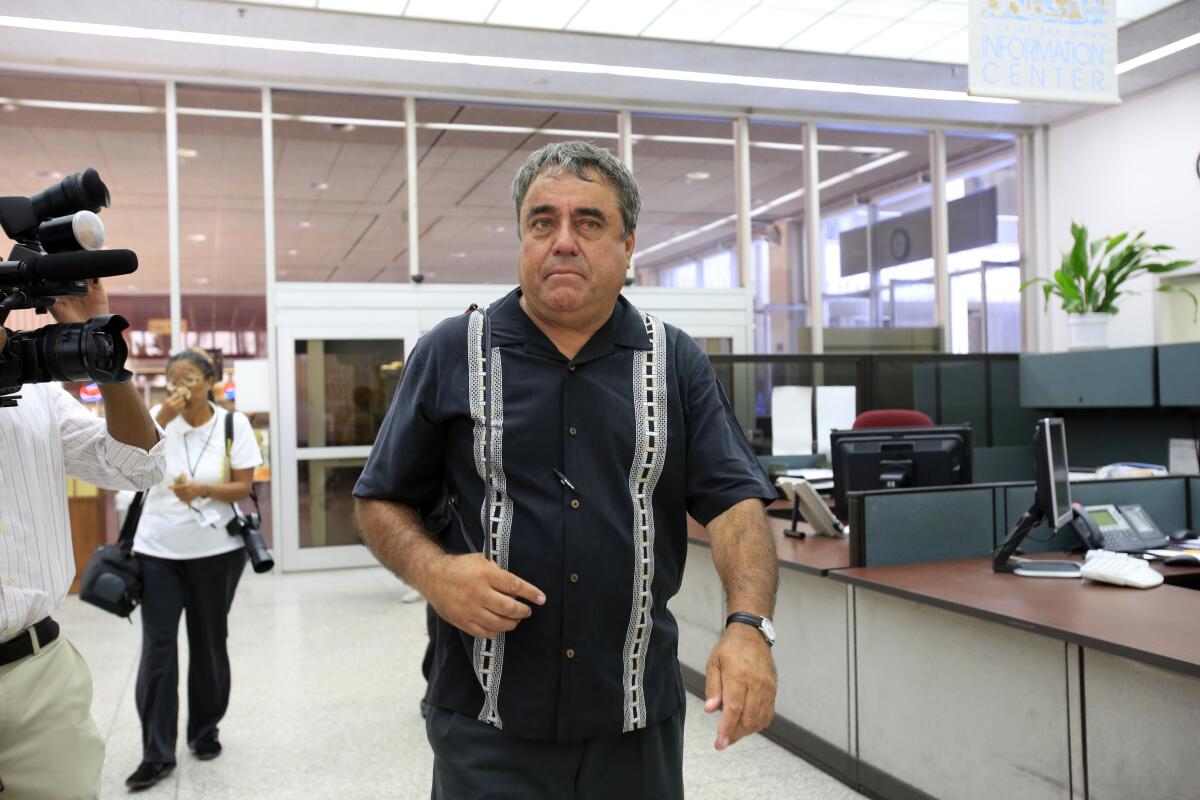
- Share via
In 2019, Enrique Morones, a nationally known immigration rights activist, went on sudden leave from Border Angels, the organization he founded. Months later, he retired, with little explanation.
Two women recently told the Union-Tribune that in Morones’ final months with Border Angels, they made sexual harassment allegations against him, which prompted an internal investigation into the then-executive director’s behavior. Morones denies the women’s claims.
For the record:
4:04 p.m. Nov. 18, 2022In an earlier version of this story, Morones said he announced his retirement at an April 2019 meeting of the Anti-Hate Crimes Coalition. While the Union-Tribune did not find evidence of a meeting that April, an attorney for Morones said after publication that Morones announced he would retire during a meeting May 1, 2019. The Union-Tribune could not confirm what happened at that meeting.
This story is for subscribers
We offer subscribers exclusive access to our best journalism.
Thank you for your support.
The Union-Tribune reviewed emails and text messages, as well as documents detailing a third-party investigation conducted into the allegations. What the women told the Union-Tribune is consistent with what they told the investigator three years ago, and many of the details line up with the written communication from Morones and witness testimony from the investigation.
The investigative report — 78 pages including exhibits — found that Morones engaged in a number of behaviors that “made volunteers and interns uncomfortable.” According to these documents, that included Morones calling women “Mrs. Morones” or “the future Mrs. Morones” as well as “Enrique’s angels.” The investigation also found he stared at and commented on women’s bodies, tried to romantically pursue a young volunteer and discussed a preference for dating women as young as 18 or 19 years old. Morones was 62 at the time, the documents say.
“It does affect me. I had to literally go to therapy for it,” Leticia Guzman, one of the women who made allegations against Morones, said in a recent interview with the Union-Tribune. “I still get triggered.”
Morones, who now runs the nonprofit Gente Unida, has built a national reputation on border and immigration issues and for decades has been a vocal figure in local activism. He has long been known for facing off against conservative pundits on cable news as well as guiding school groups on tours of the border. He advocated for the creation of the House of Mexico in Balboa Park’s House of Pacific Relations.
He is among the activists and leaders memorialized in the murals of Chicano Park, a national historic landmark.
His name was long synonymous with Border Angels, which received tax-exempt status in 2003, according to the Guidestar database. It drew young people from all over the country to volunteer at the San Diego border to help prevent migrant deaths in the region, including by leaving water in the desert to aid dehydrated border crossers.
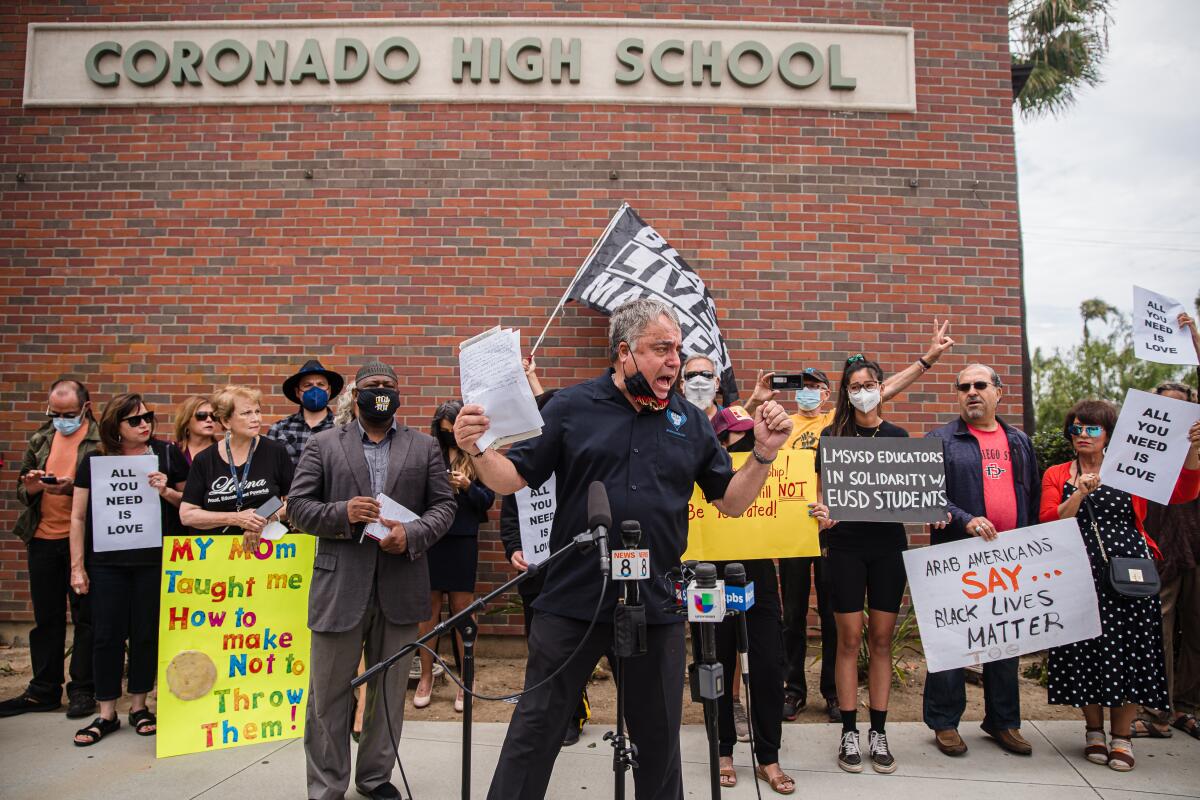
Morones said the investigation into his behavior was one-sided and not independent. He expressed disappointment that the women’s allegations would be published when reached by phone by the Union-Tribune.
He also said that he announced his retirement in April 2019 at an Anti-Hate Crimes Coalition meeting — the same month that the women came forward to the Border Angels board. The Union-Tribune found there was no coalition meeting that month. He and the board formally announced his retirement in November of that year.
“I can assure you that I didn’t do anything wrong,” Morones said.
When asked about details from the investigation, he said that his intentions weren’t romantic, that he didn’t recall certain specific circumstances and that in some cases, his phone had been hacked.
“As far as saying, ‘Have you met the future Mrs. Morones?’ I said, ‘Yeah I might have said that at a thing when we were at a bar drinking, and they would come back and say something, but never in a work environment,’” Morones said.
After an initial phone conversation, Morones declined to speak further with the Union-Tribune and did not respond to most emailed questions. He said he had not seen the investigative report’s findings.
An unsigned copy of the severance agreement reviewed by the Union-Tribune states that Morones would receive nearly a year’s salary and an announcement of his retirement that praised his work and contributions to the organization. Border Angels did not respond to a request to confirm the details of the agreement.
Luis Aragon, the board president for Border Angels both currently and at the time of the allegations, did not respond to a request for comment. Neither did Edward Orendain, an immigration attorney who was then on the board and is now the interim executive director of the organization. Most other people known to be members of the board at the time of the investigation either did not respond or declined to comment.
Hugo Castro, who was then a Border Angels board member after volunteering for years and is now with Morones at Gente Unida, said he thought what happened to Morones wasn’t fair. As a board member, he said he had been allowed to read the investigative report.
“Enrique has always had that type of humor,” Castro said. “All of a sudden it became something that wasn’t appropriate. They said they didn’t want to be around Enrique, but they all wanted to be in his office. They all wanted to be by his side.”
The women who came forward said that no one from Border Angels ever followed up with them once the investigation was completed. When the Union-Tribune shared the investigation’s findings with them, they said it was their first time hearing the results.
The women, as well as witnesses interviewed by the Union-Tribune, said that even though Morones left the organization, the way it happened made them feel like they did not get justice.
“It was very frustrating to me,” said one of the women, who asked to be identified as Piper, “especially working in a nonprofit that was supposed to be concerned with human rights. And this happens again and again, women are always asked to sacrifice in the name of a higher cause — always.”
Unwanted attention
The investigation’s final report says that Morones developed romantic feelings for Piper in particular and pursued that desired romance in a way that made her uncomfortable and “negatively impacted her work environment at Border Angels.” She was in her mid-20s at the time.
Piper, who volunteered in the organization’s office as a volunteer coordinator, asked to be identified by her family’s nickname for her out of concern for potential harassment and retaliation.
In March 2019, she began to notice Morones’ attention directed at her, she told the investigator then and the Union-Tribune more recently. She provided emails and text messages she received from him that included messages admiring her physical features with photos of her attached and invitations to spend time just the two of them.
“Eres muy bonita,” he wrote in a March 12 email reviewed by the Union-Tribune. “Me encanta tu sonrisa :)” You are very pretty. I love your smile.
Morones told the Union-Tribune that he never had any romantic intention with Piper.
“I was interested in her as a friend,” Morones said. “She had accepted to go to various things as a friend. And that was it. I even told her, ‘I’m very fond of you, and I hope you find somebody.’ I was really surprised about the turnaround.”
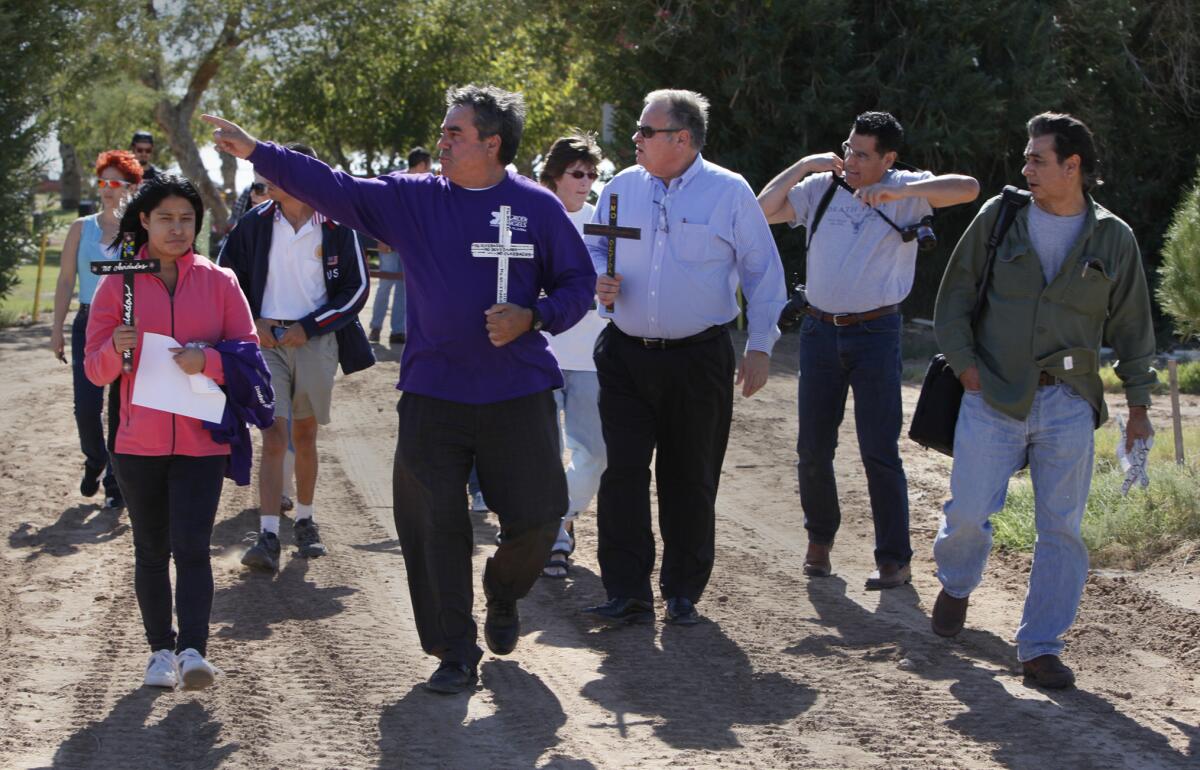
He disputed her statements that his emails made her uncomfortable, saying that she had never said she felt that way.
Though she had tried to dismiss the emails, Piper said, she noticed more and more attention from Morones. As the situation progressed, she could no longer ignore it.
In April 2019, Piper and Guzman met up with Morones and other Border Angels members at a Las Cafeteras concert at Music Box, a concert venue in downtown San Diego. Afterward, Morones insisted on following Piper home — she lived in Carlsbad at the time and he lived in central San Diego — even though she asked him not to, Piper said. Then-Border Angels board member Castro went in the car with Morones.
The experience made Piper feel unsafe, she said.
Afterward, Piper said, Morones told her that he knew exactly how many miles away she lived. Morones told the Union-Tribune he did not recall saying that.
He said he was worried about how much Piper had to drink and that she consented to being followed.
Castro told the Union-Tribune he didn’t recall Piper telling them not to follow her and that if she had, they wouldn’t have done it.
Coming forward
Roughly a week after the concert, Border Angels volunteers and supporters gathered at Border X, a brewery in Barrio Logan, the night before Chicano Park Day. Border Angels gave Piper a hotel room so that she wouldn’t have to make the trip back and forth to Carlsbad several times over the weekend, she said.
At Border X, Piper decided to leave without telling anyone because she said she was concerned that Morones would try to walk back to her hotel with her.
Another volunteer, a man who was in his early 30s at the time, left around the same time she did. The man told the investigator that Morones had previously shared with him that Morones had feelings for Piper. The man asked not to be publicly identified out of concerns that his involvement might affect his work.
A little before 11:30 p.m. that night, Morones emailed the man, according to copies of the email shared with the investigator and reviewed by the Union-Tribune.
“Trust is big with me, huge,” Morones wrote. “You lost it. Buena suerte.”
“What do you mean?” the man responded.
“Did you drive her back to hotel???” Morones wrote.
“Did not,” the man responded, adding that he was with the woman he was dating at the time.
In the emails that followed, the man encouraged Morones to talk things out with him but was ultimately unsuccessful. He left the organization soon after and has since avoided getting involved in work or volunteer opportunities that might require him to interact with Morones, he told the Union-Tribune.
When the investigator asked about this incident, Morones confirmed that he had emailed the man and admitted that he had developed feelings for Piper.
However, when speaking with the Union-Tribune, Morones denied that he meant romantic feelings.
“I said I had feelings for her. I thought she was really nice, and I even let her know,” Morones said. “I have nothing to hide. I never pursued her romantically. I never tried to kiss her or grab her hand or anything like that.”
At the Chicano Park celebration, Piper avoided Morones, she said. The next day, he emailed her, telling her that he was sad that they hadn’t spent time together that weekend, that she was very special to him and that he was only looking for friendship, according to a copy shared with the investigator and reviewed by the Union-Tribune.
Piper decided to come forward and tell the organization’s board about what was happening.
Then, fellow volunteer Guzman shared what happened to her when she first joined Border Angels, and they realized there was a pattern to Morones’ behavior, both women told the Union-Tribune.
Guzman told both the investigator and the Union-Tribune that at an event at Border X soon after she began volunteering, Morones introduced her to everyone as “Mrs. Morones.” Morones offered her a drink, she said, but she declined because she was 20 at the time.
At one point, Guzman said, Morones sat next to her and told her she was beautiful. Then, she said, he touched her leg. She got up and tried to avoid sitting next to him for the rest of the evening, she said.
In another moment during the night, he invited her to go to Costa Rica with him and then later to leave with him, she said. She declined both.
When interviewed by the investigator, Morones denied touching Guzman’s leg, calling her beautiful or inviting her to Costa Rica. He said he didn’t recall any specific conversation with her.
In his phone call with the Union-Tribune, Morones left the conversation before he could be asked about his alleged behavior toward Guzman, and he did not respond to a follow-up voicemail nor several emailed requests for comment.
The investigation found that more likely than not, Morones made the comments that Guzman reported, including inviting her to Costa Rica. It said there was insufficient evidence to determine whether he touched her leg and did not address the alleged invitation to leave with him.
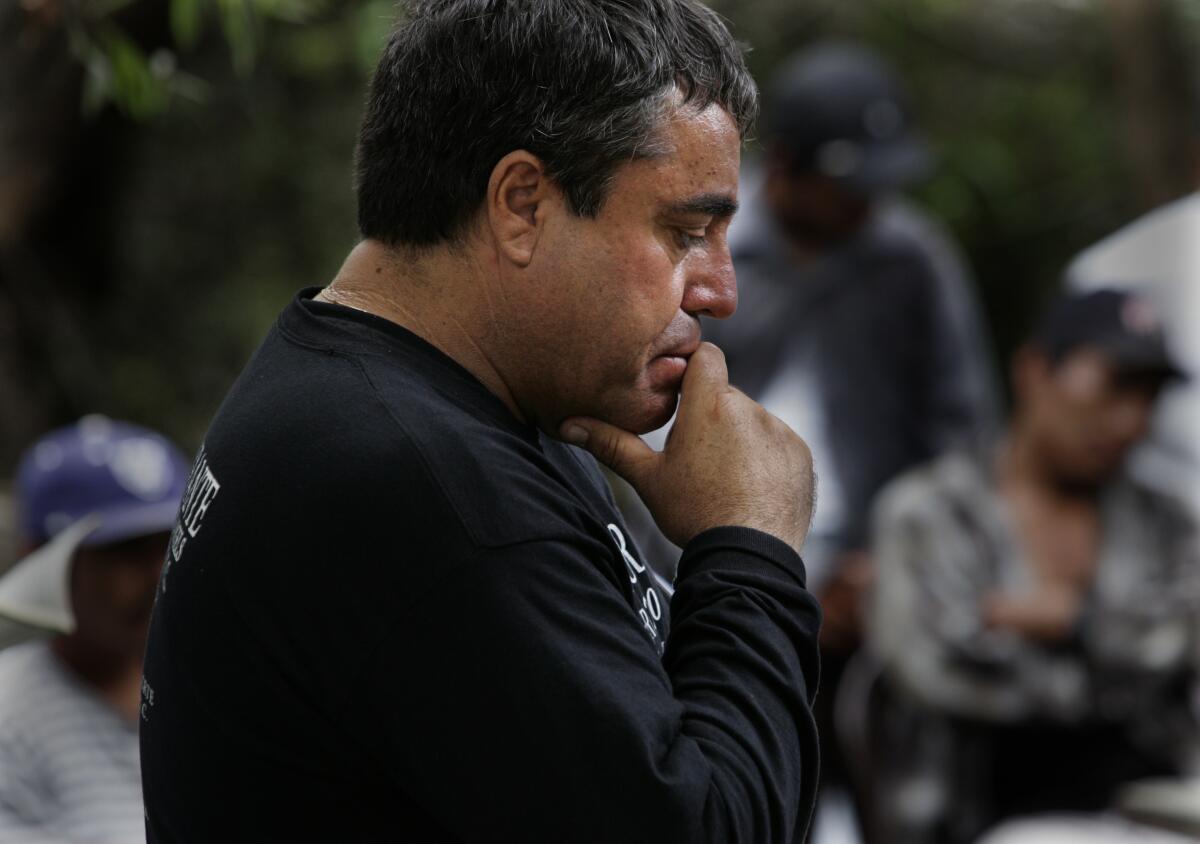
An investigation
In late April 2019, Piper approached Luis Aragon, the president of the Border Angels board, about Morones’ behavior.
“Two days later he called me back and said he talked to Enrique, and he was encouraged by his response because he was surprised and embarrassed that anyone would feel that way,” Piper recalled. “I suggested we set up a meeting between the board and volunteers, and then he got irritated at me.”
Piper said Aragon expressed concern about what the allegations might mean for Border Angels’ public image.
Piper and Guzman and their supporters pushed for the board to meet with them and to get rid of Morones. Many said they felt frustrated by the board’s speed of response.
“Along with all these problems that already exist in this world, and with all the forces that we already have to fight,” Guzman said, “you would think that an organization like Border Angels would serve and support and protect those people that want to be out there and want to make them feel safe in doing so — and it did not.”
The board decided to make a smaller investigative committee comprised of board members Aragon, Orendain, Dulce Garcia and Richard Griswold del Castillo.
“Nobody introduced themselves to us at all,” Piper recalled of her moment in front of the committee.
She said Garcia in particular seemed cold, and one of the men laughed during her interview.
Garcia, who was hired as the executive director of Border Angels after Morones’ exit and recently left the organization, did not respond to a request for comment. Neither she nor Border Angels has made public the reasons for her departure.
Griswold del Castillo, a professor at San Diego State University, also did not respond to a request for comment.
Guzman recalled that toward the end of the two-day meeting with the committee, Aragon said that what they had discussed could hurt Border Angels’ image.
She said he encouraged the people present to share positive memories they had with Morones.
“I left crying, I was so angry — so angry, so angry,” Guzman said.
Aragon did not return requests for comment on these claims.
Following the meetings, the board decided to hire an independent investigator with Andrews, Lagasse, Branch and Bell, a California-based, women-owned law firm, to look into the allegations.
Around May, Morones disappeared from Border Angels communications and events, and the Union-Tribune reported in September that he had been on paid leave.
Morones said that he wasn’t allowed to speak with the board, nor were people who wanted to give testimony supporting him. He named Dulce Aguirre, a longtime Border Angels employee, as someone he believed would have defended him.
Both Morones and Aguirre were interviewed by the independent investigator, according to the report.
Morones had a lawyer involved, according to the report, and after rescheduling the interview twice, spoke with the investigator on two days in July.
Aguirre did not respond to a request for comment from the Union-Tribune.
She told the investigator that she had seen Morones hang out privately with interns but never thought anything of it. She also said that Morones told her he thought Piper was pretty and that he was attracted to her. The report says she told Morones “not to be a ‘creeper.’”
She also told the investigator that she told Morones she didn’t feel he did anything inappropriate but that everyone takes things differently.
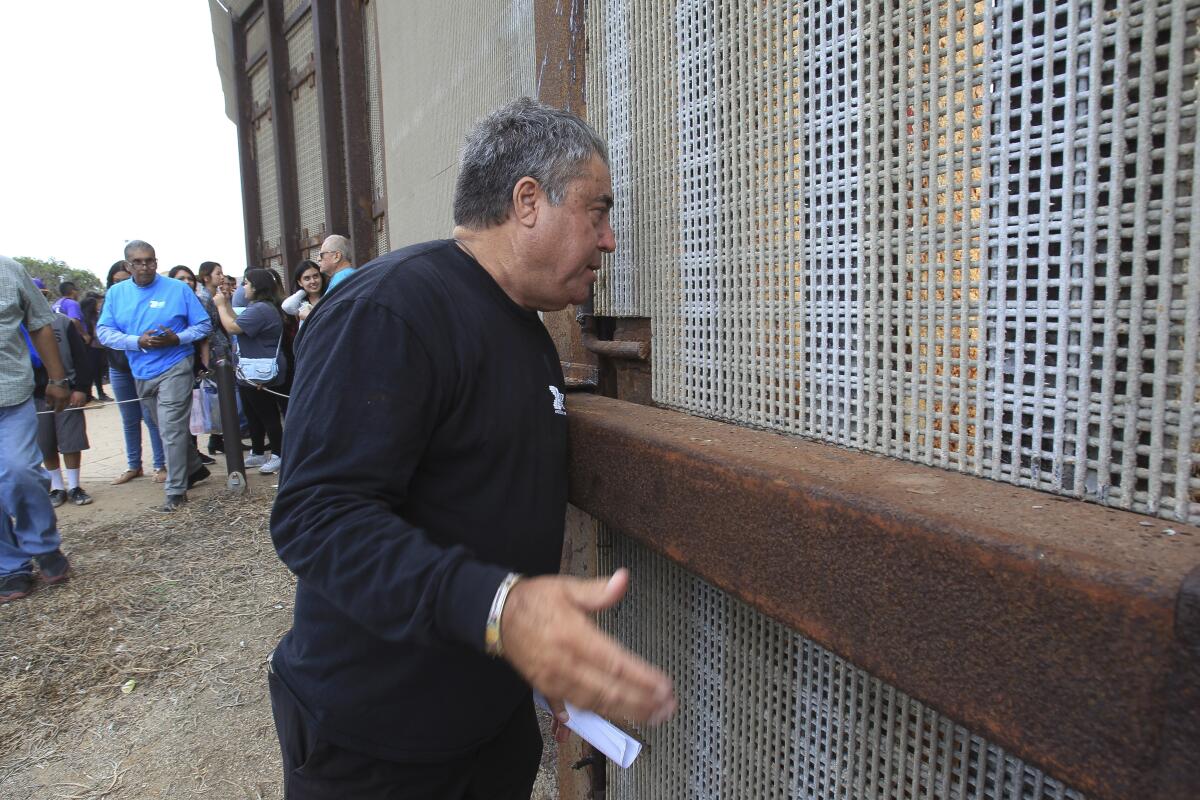
Retired
In June, after Morones was told not to contact anyone involved in the investigation, Guzman received a call from Morones’ number, according to a screenshot from her phone. She told the investigator and the Union-Tribune that she could hear someone crying on the other end of the phone.
She asked if the person was OK, and he said no, Guzman said. She asked if he needed help, and he said yes.
Morones told the investigator that he did not contact Guzman and that he’d had the FBI and San Diego police investigate someone pretending to be him to call her through a technique called “spoofing.”
He suggested to the Union-Tribune that the hacker was either a Border Angels volunteer or white supremacists.
When asked about the situation, the FBI told the Union-Tribune, “The FBI neither confirms nor denies the existence of an investigation. We have no further comment.” A San Diego police spokesperson was not able to provide any information.
The independent investigator hired by Border Angels found that Morones had, more likely than not, called Guzman.
When speaking with the Union-Tribune, Morones insisted that he did not call Guzman and that other messages supposedly sent by him were also part of the hack. It was not clear which messages he meant and he did not respond to an emailed request for clarification.
The investigative report includes statements by Morones about the phone call to Guzman being a spoofed call, but the report does not mention any other instances of him questioning the authenticity of other emails or text messages at the time in his interview with the investigator.
At Morones’ request, the Union-Tribune contacted Samantha Lozano Rangel, who said she’d volunteered with Border Angels for about five years, ending in 2018. She said she never experienced or witnessed any inappropriate behavior from Morones.
“I’m not understanding where all of this is coming from,” she said, emphasizing the work Morones has done over the years to help migrants.
Multiple witnesses who were with Border Angels in 2019 told the investigator that Morones’ behavior bothered them, according to the report, as did many interviewed by the Union-Tribune.
The final report, submitted in mid-August, recommended that Morones not return as executive director “unless and until organizational safeguards are put in place to prevent future conduct.” Those included anti-harassment and retaliation policies, a formal complaint procedure and harassment trainings, the report said.
It also recommended protocols that would’ve likely made it difficult for Morones to continue as executive director, including taking away decision-making abilities regarding volunteers and interns, limiting the events he could attend that involved volunteers and interns, and requiring him to work somewhere other than the Border Angels office. It also recommended that he not be allowed to drink at any Border Angels event.
“Mr. Morones would benefit from a better understanding of what conduct is and is not appropriate in the workplace and how his conduct may be perceived by others,” the report says.
Morones did not respond to emailed questions about these recommendations or a follow-up phone call.
The board began negotiating with Morones over his exit from the organization.
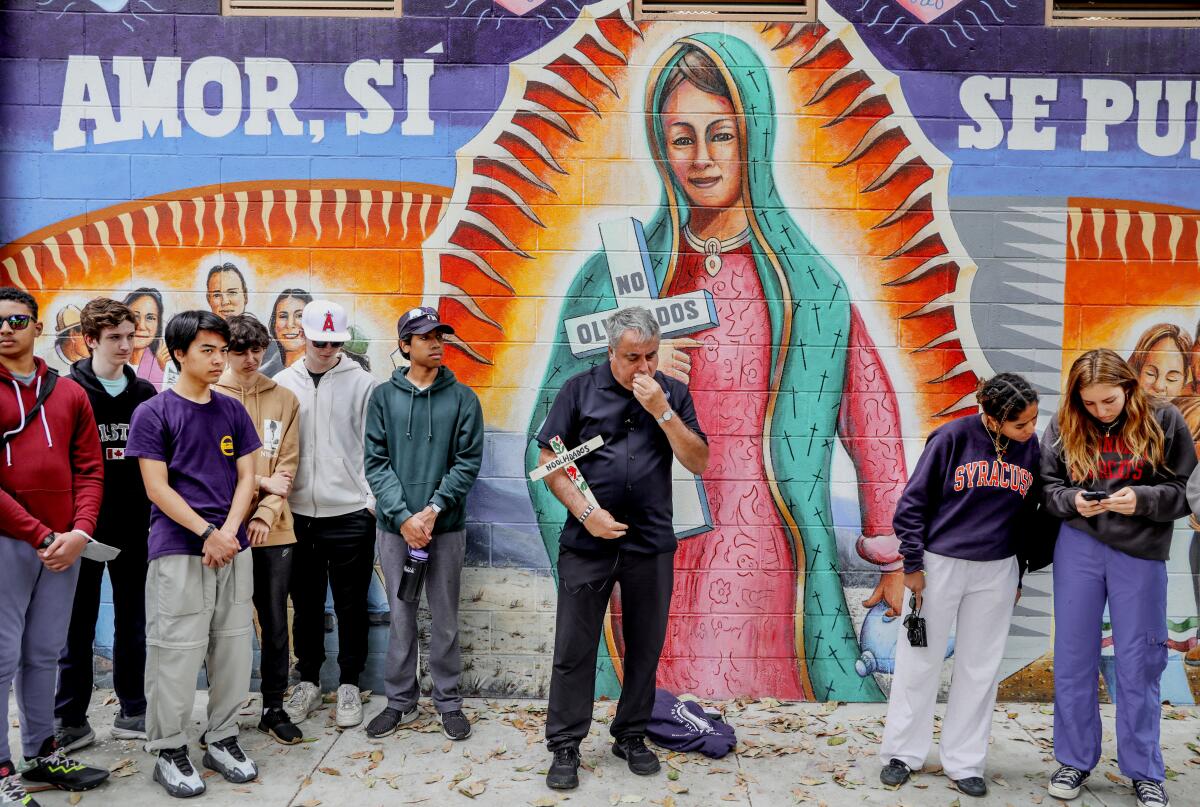
The Union-Tribune reviewed an unsigned copy of a settlement agreement that proposed announcing his retirement in exchange for $60,000 — 10 months’ salary — plus benefits. Neither Border Angels nor Morones responded to requests to confirm the details of the agreement. A 2019 tax form provided by Border Angels shows that he received $125,793 in wages and $19,364 in other compensation from the organization that year.
The agreement includes a clause prohibiting Morones from disparaging Border Angels. It also blocks both sides from talking about the agreement or the investigation.
Border Angels and Morones wrote a joint statement about his departure from the organization that praised him for his work. They announced his retirement in late November, saying that he would be focusing on work with Gente Unida, a human rights border coalition, and the House of Mexico. When asked about the reason for his departure at the time, Garcia told the Union-Tribune that Morones was “no longer associated with Border Angels” and she couldn’t comment further “as it involves a personnel matter.”
Piper and Guzman said the congratulatory retirement announcement stung.
“Border Angels could have held him accountable, but what they did instead was send out a newsletter saying, ‘Our amazing founder is retiring,’” Guzman said. “We don’t get reparations. We don’t get any of that. It’s frustrating.”
Morrissey and Fry write for the San Diego Union-Tribune.
More to Read
Sign up for Essential California
The most important California stories and recommendations in your inbox every morning.
You may occasionally receive promotional content from the Los Angeles Times.














